Energy Efficiency
15 Power-Saving Tips: Boosting Heat Pump Efficiency

Hey there!
We’ve got some game-changing power-saving tips to supercharge your heat pump efficiency. Get ready to save some serious cash while keeping your home cozy.
From understanding efficiency ratings to sealing air leaks, we’ve got you covered. We’ll also show you how to harness solar energy and improve air circulation for optimal performance.
Stick with us for the lowdown on 15 expert-approved tips to boost your heat pump efficiency and keep those energy bills in check.

Let’s dive in!
Key Takeaways
- Regular maintenance and timely repairs are crucial for optimal heat pump performance and energy savings.
- Improving home insulation through sealing air leaks and insulating attics and crawl spaces reduces strain on the heat pump and maximizes energy efficiency.
- Utilizing programmable thermostats and ceiling fans can help save energy by scheduling temperature adjustments and enhancing airflow in the home.
- Harnessing solar energy and improving air circulation through solar panel installation, geothermal heating, and solar water heating can reduce reliance on traditional electricity sources, improve heat pump efficiency, and lead to long-term cost savings.
Understanding Heat Pump Efficiency Ratings
We will now delve into the topic of understanding heat pump efficiency ratings.
When it comes to maximizing the efficiency of your heat pump, it’s important to understand the ratings.
The Seasonal Energy Efficiency Ratio (SEER) measures the cooling efficiency, while the Heating Seasonal Performance Factor (HSPF) measures the heating efficiency.

Look for heat pumps with higher SEER and HSPF ratings for better energy savings.
To ensure optimal performance, regular maintenance is crucial.
Follow a heat pump maintenance checklist, which includes tasks like cleaning or replacing air filters, checking thermostat settings, and inspecting outdoor units for debris.
If you encounter common heat pump issues, such as inadequate heating or cooling, strange noises, or frequent cycling, consult a professional technician for troubleshooting and repairs.
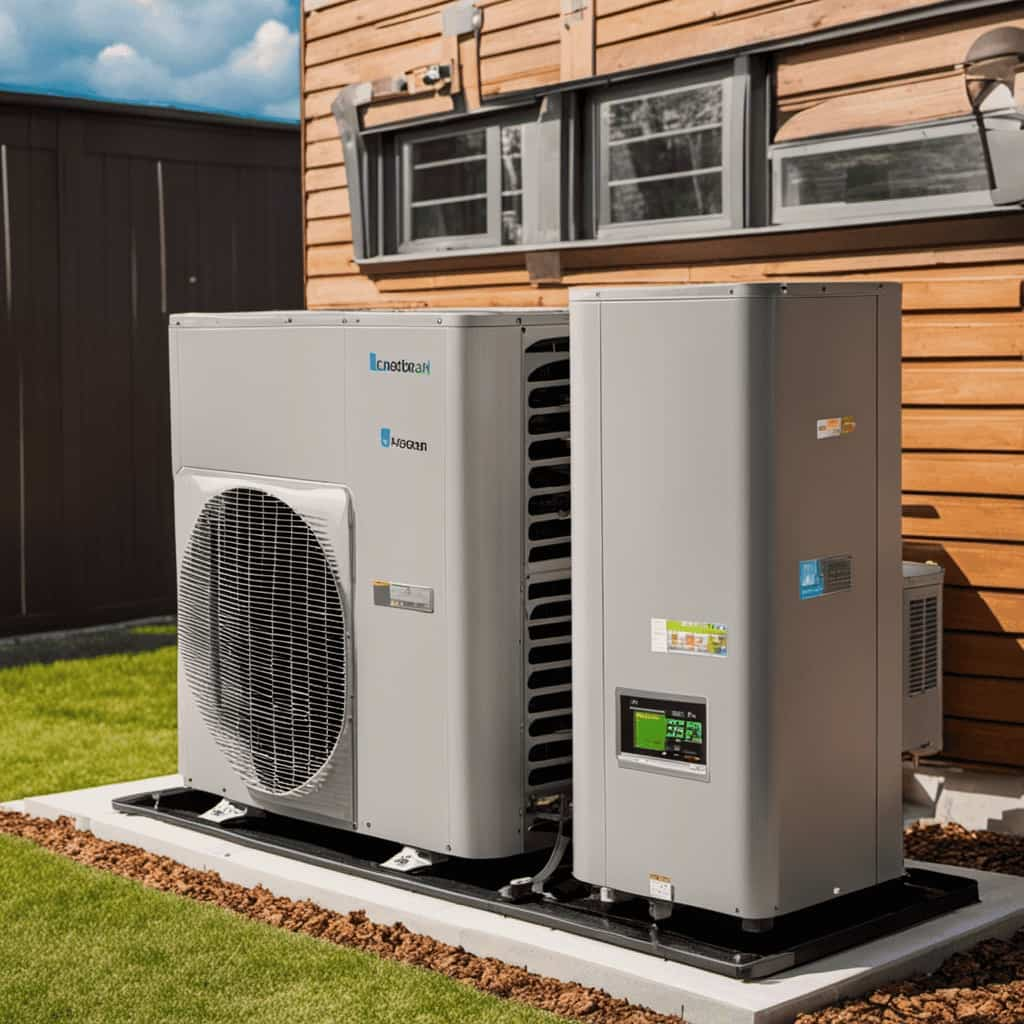
Importance of Regular Maintenance for Heat Pump Efficiency
Regular maintenance is essential for maximizing heat pump efficiency. By scheduling regular maintenance for your heat pump, you can enjoy a range of benefits that will contribute to its efficiency and performance.
First and foremost, regular maintenance helps to keep your heat pump clean and free from debris, ensuring optimal airflow and preventing any potential obstructions.
Additionally, maintenance allows for the detection and timely repair of any minor issues before they become major problems, which can negatively impact efficiency.
Furthermore, regular maintenance helps to maintain proper refrigerant levels, which is crucial for the heat pump’s overall efficiency.
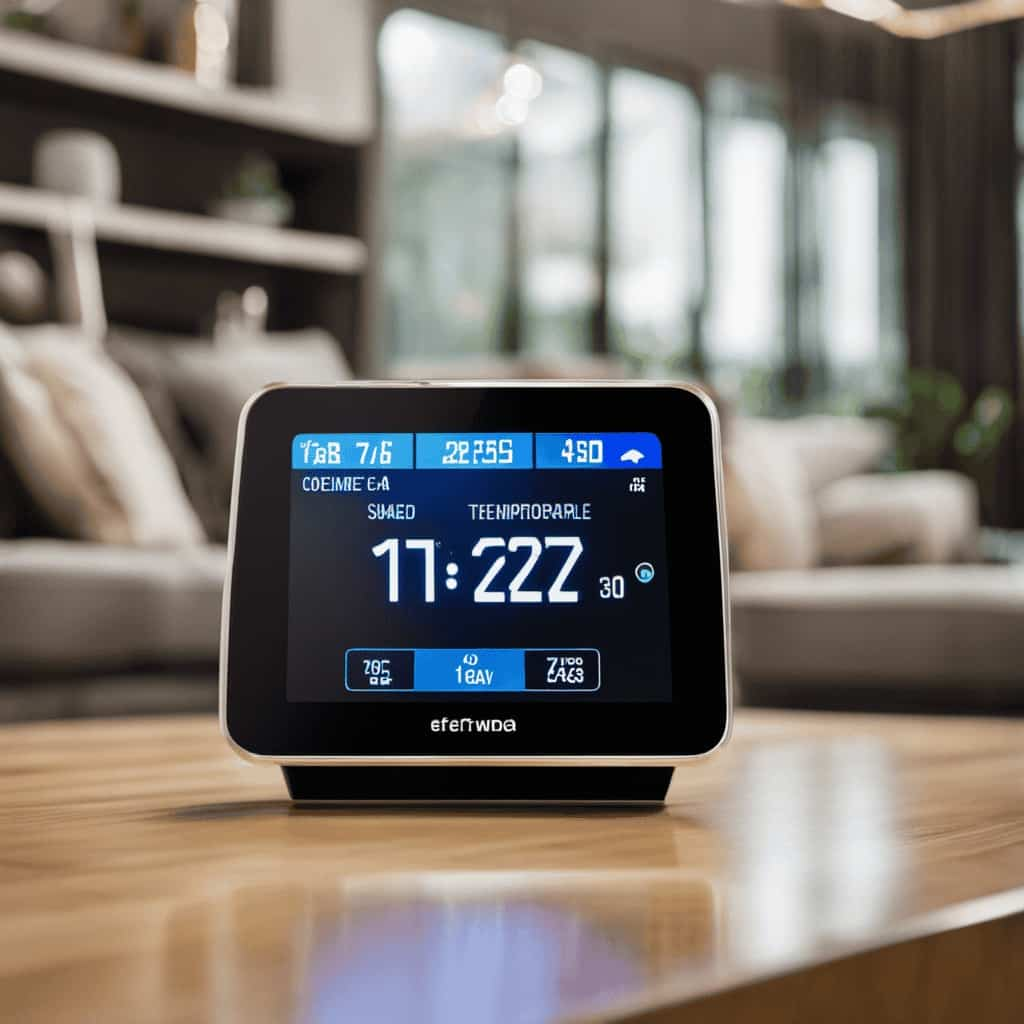
Tips for Properly Insulating Your Home
One of the most important factors in improving heat pump efficiency is ensuring proper insulation throughout our home. By implementing effective insulation techniques, we can maximize energy efficiency and reduce heat loss. Here are three tips for properly insulating your home:
-
Seal air leaks: Identify any gaps or cracks in windows, doors, and walls, and use weatherstripping or caulking to seal them. This will prevent warm air from escaping and cold air from entering, ultimately reducing the workload on your heat pump.
-
Add insulation to attics and crawl spaces: Insulating these areas with materials such as fiberglass or cellulose can significantly improve thermal efficiency. It helps maintain a consistent temperature throughout your home and reduces the strain on your heat pump.
-
Insulate pipes and ductwork: Insulating exposed pipes and ductwork helps retain heat as it travels through your home. This prevents heat loss and ensures that warm air reaches its intended destination.

Proper insulation is key to maximizing heat pump efficiency and reducing energy consumption.
Now let’s explore the benefits of utilizing programmable thermostats for even greater energy savings.
Utilizing Programmable Thermostats for Energy Savings
To further improve energy efficiency, we can maximize the benefits of our heat pump by utilizing programmable thermostats. These thermostats allow us to set temperature schedules, which can lead to significant energy savings.
By programming the thermostat to lower the temperature when we’re away or sleeping, we can avoid wasting energy on heating or cooling an empty house. Additionally, programmable thermostats can be set to automatically adjust the temperature before we wake up or return home, ensuring comfort while still saving energy.

Some thermostats even have features that allow us to control them remotely through our smartphones, giving us the flexibility to adjust the temperature even when we’re not at home.
Effectively Sealing Air Leaks in Your Home
We can effectively seal air leaks in our home by identifying and addressing them using weatherstripping and caulking. Here are three sealing techniques that you can use to keep your home cozy and energy-efficient:
-
Weatherstripping: Check windows and doors for gaps and cracks. Apply weatherstripping to seal these areas and prevent drafts.
-
Caulking: Inspect the exterior of your home for gaps around pipes, wires, and vents. Use caulk to seal any openings and keep outside air from entering your home.

-
Insulation: Make sure your attic and walls are properly insulated. This won’t only help seal air leaks but also improve the overall energy efficiency of your home.
By implementing these sealing techniques, you can reduce energy waste and save money on heating and cooling costs.
Now, let’s explore the benefits of zone heating and cooling.
Transition sentence: Once you have effectively sealed air leaks in your home, you can further optimize your energy usage by exploring the benefits of zone heating and cooling.

The Benefits of Zone Heating and Cooling
By utilizing zone heating and cooling, we can optimize comfort and energy efficiency in different areas of our home. Zone heating allows us to control the temperature in specific rooms or zones, which means we only heat or cool the areas that are being used. This can lead to significant energy savings and lower utility bills. Additionally, zone heating allows for personalized comfort, as each family member can set their preferred temperature in their own space. On the other hand, ductless heating systems offer several advantages, such as increased energy efficiency and improved indoor air quality. Ductless systems use individual units to heat or cool specific areas, eliminating the need for ductwork and reducing energy losses. Furthermore, geothermal heating provides even greater benefits, such as lower operating costs, reduced carbon footprint, and long-term durability.
| Benefits of Zone Heating | Advantages of Ductless Heating |
|---|---|
| Energy savings | Increased energy efficiency |
| Personalized comfort | Improved indoor air quality |
| Reduced utility bills | No ductwork required |
| Lower carbon footprint | Long-term durability |
Maximizing Efficiency With Proper Air Filter Maintenance
To maximize the efficiency of our heat pump, it’s important to prioritize proper air filter maintenance.
By cleaning the air filters regularly and replacing them when they become dirty, we can ensure that the heat pump is able to operate at its full potential.
Neglecting this simple task can lead to reduced airflow, decreased efficiency, and even system malfunctions.

Clean Air Filters Regularly
Regularly cleaning air filters is essential for maximizing efficiency and should be done frequently. Neglecting this important maintenance task can lead to reduced airflow, increased energy consumption, and decreased heat pump performance.
Here are three reasons why cleaning air filters regularly is crucial:
-
Improved air quality: Dirty air filters can accumulate dust, allergens, and other pollutants, affecting the air you breathe. By cleaning the filters regularly, you can ensure cleaner and healthier indoor air quality.
-
Energy savings: Clogged air filters make your heat pump work harder, resulting in higher energy consumption and increased utility bills. By cleaning the filters, you can help your heat pump operate more efficiently, reducing energy usage and saving money.

-
Prolonged heat pump lifespan: Regular air filter maintenance reduces strain on your heat pump’s components, helping to extend its lifespan. By keeping the filters clean, you can prevent unnecessary wear and tear on the system, avoiding costly repairs and replacements.
Replace Filters When Dirty
When filters become dirty, we should promptly replace them to maximize efficiency and ensure optimal air filter maintenance. Dirty filters restrict airflow, forcing the heat pump to work harder, which decreases its efficiency and increases energy consumption. By replacing filters regularly, we can improve the heat pump’s performance and save on energy costs.
To maintain clean filters, it’s recommended to check them monthly and replace them every three months or as needed. However, households with pets or individuals with allergies may need to replace filters more often. It’s important to choose the right filter for your heat pump system, considering factors such as filter size, type, and MERV rating.
Regularly replacing filters not only keeps the heat pump running efficiently but also improves indoor air quality by removing dust, pollen, and other airborne particles. With proper air filter maintenance, we can ensure a comfortable and healthy living environment while maximizing the efficiency of our heat pump system.

Using Ceiling Fans to Supplement Heat Pump Efficiency
We can enhance heat pump efficiency by utilizing ceiling fans. Ceiling fans can help improve airflow in your home, which in turn can help your heat pump work more efficiently. Here are three ways you can use ceiling fans to supplement heat pump efficiency:
-
Adjust fan speed:
In the winter, set your fan to rotate clockwise at a low speed. This will help push warm air that has risen to the ceiling back down into the room, making your heat pump’s job easier. -
Use fans strategically:
Place fans near registers or vents to help distribute warm air throughout your home. This can help reduce the workload on your heat pump and make your home more comfortable. -
Use fans in conjunction with your heat pump:
By using ceiling fans alongside your heat pump, you can lower the temperature setting on your heat pump without sacrificing comfort. This can lead to energy savings and increased efficiency.
Optimizing Heat Pump Performance With Smart Technology
Let’s explore how we can optimize heat pump performance with smart technology to maximize efficiency.
One way to achieve this is through smart home integration. By connecting your heat pump to a smart home system, you can control and monitor its operation remotely. This allows you to adjust the temperature settings even when you’re away from home, ensuring that your heat pump is only running when needed.
With remote temperature control, you can conveniently set the desired temperature before you arrive home, so you can step into a comfortable environment.
Additionally, smart technology can provide valuable insights into your heat pump’s performance, helping you identify any potential issues and schedule maintenance as needed.

The Role of Proper Sizing in Heat Pump Efficiency
Proper sizing plays a crucial role in maximizing heat pump efficiency and ensuring optimal performance. When it comes to heat pump installation, getting the right size is key. Here are three reasons why proper heat pump sizing is important:
-
Energy Efficiency: A properly sized heat pump will operate at its peak efficiency, minimizing energy waste and reducing your utility bills. Oversized or undersized units can lead to inefficiencies and higher energy consumption.
-
Comfort: A correctly sized heat pump will provide consistent and comfortable heating and cooling throughout your home. It will maintain the desired temperature without constant cycling on and off or struggling to reach the set point.
-
Longevity: Properly sized heat pumps are less likely to experience premature wear and tear. They won’t have to work as hard to maintain the desired temperature, resulting in less strain on the system and potentially increasing its lifespan.

The Benefits of Energy-Efficient Windows and Doors
Energy-efficient windows and doors can significantly reduce heat loss and improve insulation in our homes. By investing in these sustainable building materials, we can enjoy several benefits that contribute to both our comfort and energy savings.
Here are the advantages of energy-efficient windows and doors:
| Benefits | Description |
|---|---|
| Enhanced insulation | Energy-efficient windows and doors are designed with advanced insulation materials and techniques, preventing heat transfer and reducing drafts. This helps to maintain a consistent indoor temperature and reduce the load on our heating and cooling systems. |
| Reduced energy consumption | With improved insulation, we can rely less on our heating and cooling appliances, resulting in lower energy consumption and reduced utility bills. These energy savings can add up over time, making a significant difference in our monthly expenses. |
| Increased comfort | Energy-efficient windows and doors help to eliminate cold spots and drafts, ensuring a more comfortable living environment. By reducing heat loss, we can maintain a cozy and consistent temperature throughout our home, keeping us comfortable all year round. |
Harnessing Solar Energy to Boost Heat Pump Efficiency
To maximize our heat pump efficiency, we can harness solar energy as a means of boosting its performance. Here are three practical ways to utilize solar energy and enhance the efficiency of your heat pump:
-
Solar Panel Installation: Installing solar panels on your roof or in your yard can generate electricity to power your heat pump. By using clean and renewable solar energy, you can reduce your reliance on traditional electricity sources and lower your energy bills.

-
Geothermal Heating: Combining geothermal heating with your heat pump can further improve efficiency. Geothermal systems utilize the earth’s natural heat to warm your home, reducing the workload on your heat pump and increasing its efficiency.
-
Solar Water Heating: Installing solar water heating panels can preheat the water before it enters your heat pump. This reduces the energy required by the heat pump to heat the water, resulting in improved efficiency and lower energy costs.
Improving Air Circulation for Enhanced Heat Pump Efficiency
To optimize our heat pump’s efficiency, we can improve air circulation within our home. One way to do this is by improving airflow throughout the house. Make sure that furniture and other objects aren’t blocking the vents or obstructing the flow of air.
Additionally, clean or replace air filters regularly to ensure that they aren’t clogged and restricting airflow.

Optimizing ventilation is another key factor in enhancing heat pump efficiency. Consider using ceiling fans or portable fans to help circulate the air and maintain a consistent temperature throughout your home.
By improving air circulation and optimizing ventilation, you can ensure that your heat pump operates at its highest efficiency.
Now let’s move on to the next section, where we’ll discuss how to utilize heat pump settings for optimal efficiency.
Utilizing Heat Pump Settings for Optimal Efficiency
When it comes to utilizing heat pump settings for optimal efficiency, there are a few key points to keep in mind.
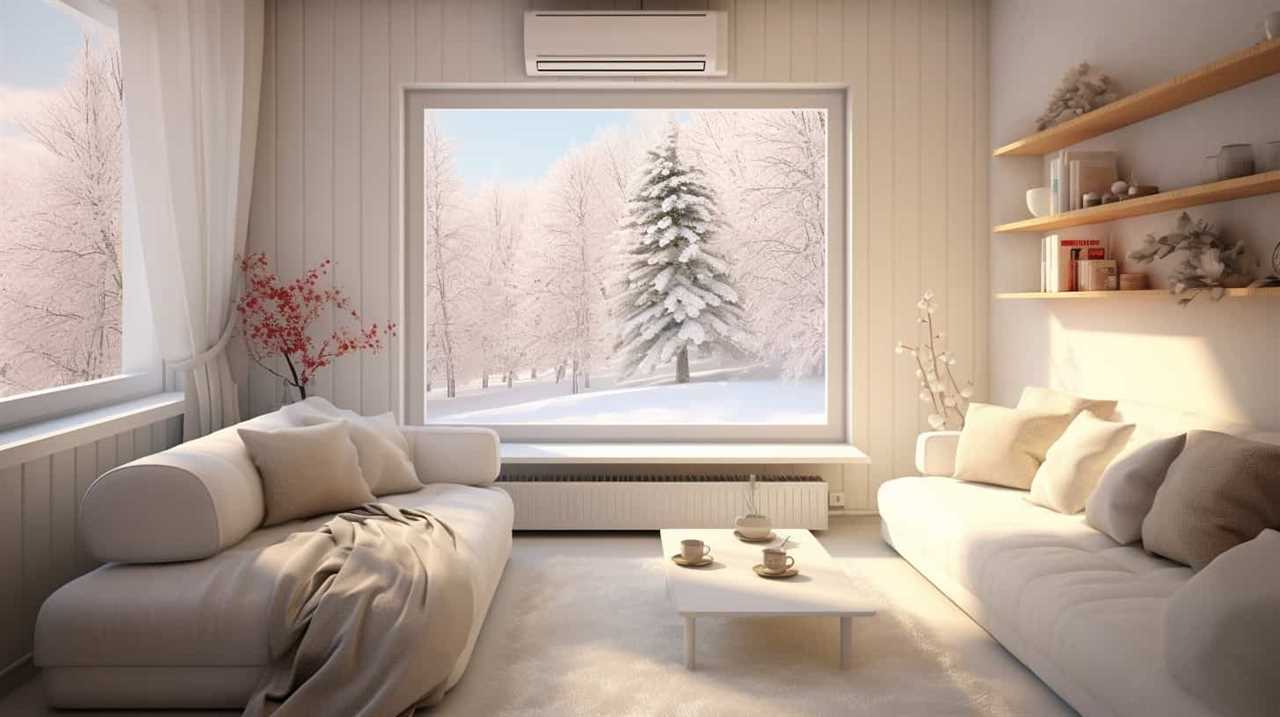
First, setting the ideal temperature is crucial. By finding the right balance, we can ensure comfort while minimizing energy consumption.
Additionally, scheduling the heat pump to run at specific times can further enhance efficiency by only heating or cooling the space when it’s needed.
Ideal Temperature Settings
Our goal is to maximize the efficiency of our heat pump by setting the temperature to an ideal level. Here are three energy-saving thermostat settings to help you achieve this:
-
Set the temperature in the ideal range: The ideal temperature range for both heating and cooling is between 68 to 72 degrees Fahrenheit. By keeping your thermostat within this range, you can ensure optimal comfort while minimizing energy consumption.

-
Use programmable thermostats: Programmable thermostats allow you to automatically adjust the temperature based on your schedule. Set it to lower the temperature when you’re away or sleeping, and raise it before you return or wake up. This way, you can save energy without sacrificing comfort.
-
Take advantage of heat pump settings: Heat pumps have settings like ‘eco’ or ‘energy-saving’ mode. These modes optimize the heat pump’s performance by adjusting the temperature and fan speed. Utilize these settings to further enhance energy efficiency and reduce your utility bills.
Scheduling Heat Pump
We can optimize the efficiency of our heat pump by scheduling its settings for optimal performance. By properly scheduling maintenance and troubleshooting common issues, we can ensure that our heat pump operates at its best. Here are some tips to help you schedule your heat pump effectively:
| Schedule | Maintenance | Troubleshooting |
|---|---|---|
| Monthly | Clean air filters | Check for refrigerant leaks |
| Seasonally | Inspect outdoor unit | Check electrical connections |
| Annually | Schedule professional tune-up | Check thermostat settings |
Regularly cleaning air filters and inspecting the outdoor unit can improve airflow and prevent clogs. Checking for refrigerant leaks and electrical connections can prevent system malfunctions. And scheduling a professional tune-up annually and checking thermostat settings can ensure optimal performance. By following these scheduling tips, you can maximize the efficiency of your heat pump and save on energy costs.

The Importance of Professional Installation and Inspection
One important aspect of ensuring the efficiency of your heat pump is to have it professionally installed and inspected by a certified technician. Here are three reasons why professional installation and regular inspections are crucial for maximizing the performance and longevity of your heat pump:
-
Optimal Performance: A professional installation ensures that your heat pump is set up correctly, allowing it to operate at its peak performance. This leads to improved energy efficiency and lower utility bills.
-
Safety Assurance: A certified technician can identify any potential safety hazards during the installation process and address them promptly. Regular inspections also help detect any issues that may arise over time, ensuring your heat pump remains safe to use.
-
Warranty Protection: Many manufacturers require professional installation to validate the warranty on your heat pump. By having your system installed by a professional and scheduling regular inspections, you can maintain the warranty coverage and save money on potential repairs.
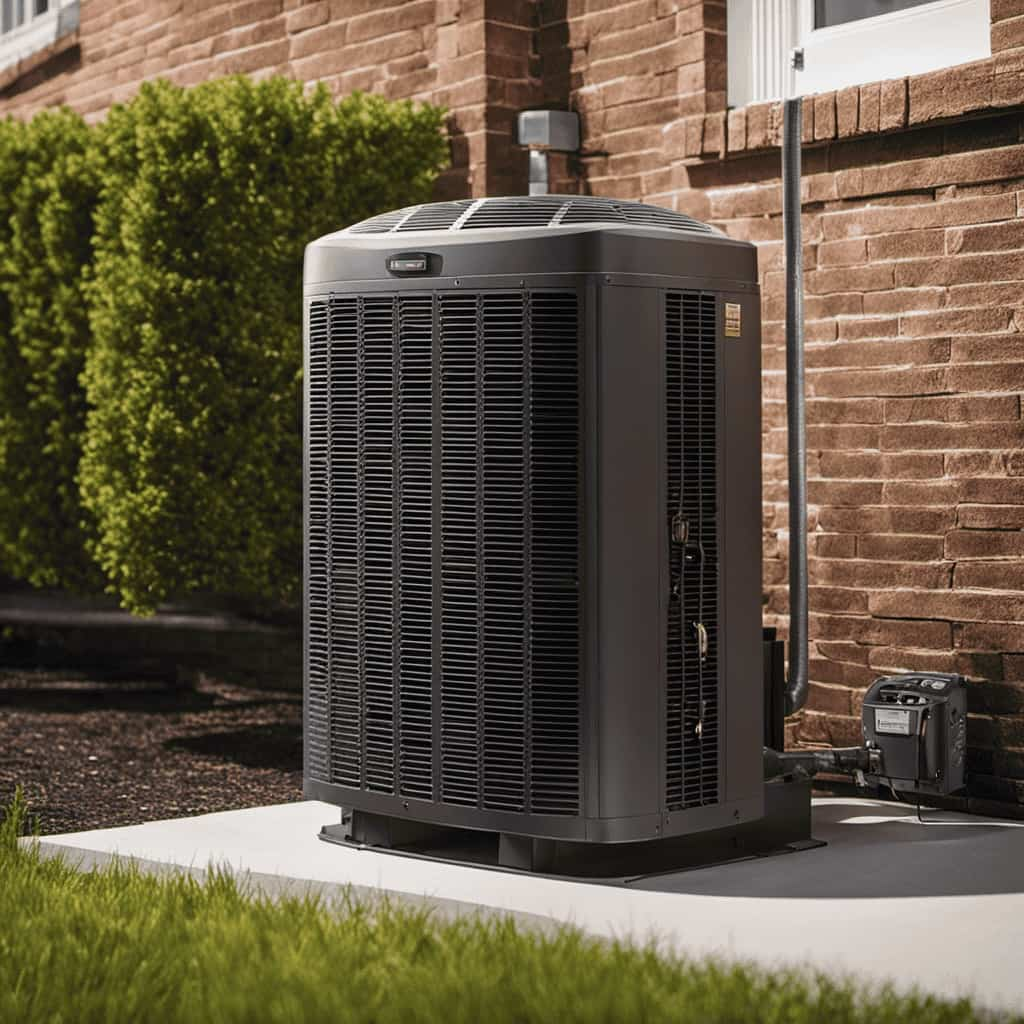
Investing in professional installation and regular inspections not only ensures the efficiency and safety of your heat pump but also protects your investment in the long run.
Frequently Asked Questions
How Often Should I Schedule Maintenance for My Heat Pump?
We find that scheduling maintenance for our heat pump at least once a year is crucial for maintaining its efficiency. Regular check-ups ensure optimal performance and can help identify potential issues early on.
What Are Some Common Signs That My Heat Pump May Need Repairs?
When it comes to heat pump troubleshooting, recognizing signs of heat pump malfunction is key. Some common indicators include strange noises, uneven heating or cooling, and increased energy bills. Regular maintenance can help avoid major repairs.
Can I Install a Programmable Thermostat Myself, or Should I Hire a Professional?
We can definitely install a programmable thermostat ourselves, but it’s worth considering hiring a professional for a seamless installation. They have the expertise to ensure optimal performance and can address any potential issues.

What Are Some Common Air Leaks in Homes That Can Affect Heat Pump Efficiency?
Some common air leaks in homes that can affect heat pump efficiency include gaps around windows and doors, poorly sealed ductwork, and insufficient insulation. To address these issues, consider using sealing techniques and insulation materials.
How Can I Determine if My Heat Pump Is the Right Size for My Home?
To determine if our heat pump is the right size for our home, we should consider factors like square footage, insulation, and climate. Proper heat pump sizing is crucial for energy consumption and overall efficiency.
Conclusion
In conclusion, by implementing these power-saving tips, you can greatly enhance the efficiency of your heat pump and reduce your energy consumption.
Remember, ‘a stitch in time saves nine,’ so taking proactive measures now will save you money in the long run.

With regular maintenance, proper insulation, and smart thermostat usage, you can create a comfortable and energy-efficient home.
So, start making these changes today and enjoy the benefits for years to come.
Energy Efficiency
Top Energy-Efficient Heat Pump Models Reviewed


We have completed the research and identified the best energy-efficient heat pump models for you.
Get ready to save on your energy bills and keep your home comfortable all year round.
In this article, we’ll be reviewing the Rheem RP20, Lennox XP25, Carrier Infinity 20, Trane XV20i, and Daikin Quaternity heat pumps.
These models are packed with advanced features and cutting-edge technology.
So, sit back, relax, and let us guide you through the world of energy-efficient heat pumps.
Key Takeaways
- The Rheem RP20, Lennox XP25, Carrier Infinity 20, and Trane XV20i are among the top energy-efficient heat pump models available.
- These models feature advanced technologies such as intelligent eye technology, 4-way airflow system, and advanced filtration system, which contribute to energy savings and improved indoor air quality.
- The Daikin Quaternity heat pump stands out for its high SEER rating, superior performance, and ability to handle extreme weather conditions.
- In addition to their innovative features, these heat pump models offer competitive pricing, long-term cost savings, and warranty coverage, making them an excellent choice for energy-efficient heating and cooling.
Rheem RP20 Heat Pump
The Rheem RP20 Heat Pump stands out as an energy-efficient option due to its exceptional performance and range of features. It offers advanced technology and innovative design, ensuring optimal comfort while minimizing energy consumption. The heat pump features a variable-speed motor that adjusts its speed according to the heating or cooling needs of the home, resulting in reduced energy usage and lower utility bills. Additionally, it is equipped with a two-stage compressor, allowing for more precise temperature control and enhanced efficiency. Overall, the Rheem RP20 Heat Pump is a reliable and energy-efficient solution that provides exceptional performance and comfort for any home.
Lennox XP25 Heat Pump
We found the Lennox XP25 Heat Pump to be an excellent choice for energy efficiency due to its innovative features and advanced technology.
Here are some key points that make the Lennox XP25 Heat Pump stand out:

- Variable-capacity operation allows for precise temperature control and reduced energy consumption.
- The XP25 is ENERGY STAR® certified, ensuring high energy efficiency and cost savings.
- It features a SilentComfort™ technology that minimizes noise levels for a quieter operation.
- The unit is equipped with a SunSource® Solar-Ready option, allowing you to harness the power of the sun for even greater energy savings.
- The XP25 comes with the iComfort® S30 smart thermostat, which provides precise temperature control and advanced programming capabilities.
With its cutting-edge technology and energy-efficient design, the Lennox XP25 Heat Pump offers a reliable and cost-effective solution for maintaining a comfortable home environment while reducing energy consumption.
Now, let’s move on to the next heat pump model: the Carrier Infinity 20 Heat Pump.
Carrier Infinity 20 Heat Pump
Now let’s take a look at the Carrier Infinity 20 Heat Pump, which offers exceptional energy efficiency and advanced features. The Carrier Infinity 20 heat pump is known for its impressive energy-saving capabilities and innovative technologies. It is designed to provide optimal comfort while reducing energy consumption.
Here is a table highlighting the pros and cons of the Carrier Infinity 20 heat pump:

| Pros | Cons |
|---|---|
| Excellent energy efficiency | Higher upfront cost |
| Quiet operation | Requires professional installation |
| Advanced features for enhanced comfort | Limited availability of parts |
The Carrier Infinity 20 heat pump incorporates several energy-saving features, including variable-speed technology, which allows the unit to adjust its output based on the heating or cooling demands, resulting in lower energy consumption. Additionally, it utilizes a two-stage compressor, which helps maintain consistent temperatures and reduces energy usage.
In the next section, we will discuss the Trane XV20i heat pump and its energy-efficient features.
Trane XV20i Heat Pump
Let’s dive into the features of the Trane XV20i Heat Pump, known for its energy efficiency and innovative technology. Here is an analysis of its efficiency and a cost comparison:
Efficiency Analysis:

- The Trane XV20i boasts a SEER (Seasonal Energy Efficiency Ratio) rating of up to 22, making it highly efficient in both heating and cooling modes.
- It also has a HSPF (Heating Seasonal Performance Factor) of up to 10, ensuring efficient heat production during colder months.
- With its variable-speed compressor, the XV20i adjusts its output based on the current temperature and demand, optimizing energy usage.
- The unit’s ComfortLink™ II communicating technology allows for precise control and coordination with other HVAC components, further enhancing efficiency.
- The TruComfort™ technology ensures consistent and even temperatures throughout the home, reducing energy wastage.
Cost Comparison:
- While the initial cost of the Trane XV20i may be higher than some other models, its energy efficiency can lead to significant long-term savings on utility bills.
- The variable-speed compressor and precise control capabilities enable the XV20i to operate at lower speeds for longer durations, resulting in reduced energy consumption.
Transitioning into the subsequent section about the ‘daikin quaternity heat pump’, another top energy-efficient model worth exploring is…
Daikin Quaternity Heat Pump
Moving on to the Daikin Quaternity Heat Pump, let’s explore its features and energy efficiency.
The Daikin Quaternity is a highly efficient heat pump model that offers a wide range of benefits. It comes equipped with advanced features such as intelligent eye technology, which detects human presence and adjusts the temperature accordingly to save energy. The Quaternity also boasts a unique 4-way airflow system that ensures even distribution of warm or cool air throughout the room.

In terms of energy efficiency, the Quaternity has a high SEER rating of up to 20.6, making it one of the most efficient heat pumps on the market. When compared to other Daikin heat pump models, the Quaternity stands out for its superior performance and innovative features.
As for pricing, the Daikin Quaternity is competitively priced, offering excellent value for money.
Frequently Asked Questions
What Is the Average Lifespan of These Heat Pump Models?
On average, the lifespan of these heat pump models is around 15-20 years. However, it is important to note that proper maintenance is crucial to ensure the longevity of the unit. Regular servicing and cleaning can significantly extend its lifespan.
Do These Heat Pump Models Come With a Warranty?
Yes, these heat pump models come with a warranty. We understand that warranty coverage is important to guarantee customer satisfaction. Rest assured, our reviewed models offer reliable warranties to protect your investment.

Are These Heat Pump Models Eligible for Any Energy Efficiency Rebates or Incentives?
Yes, these heat pump models are eligible for energy efficiency rebates and incentives. They offer significant energy savings compared to traditional heating methods, making them a cost-effective and environmentally-friendly choice.
Can These Heat Pump Models Be Used in Both Residential and Commercial Settings?
Yes, these heat pump models can be used in both residential and commercial settings. When considering cost, it’s important to note that residential applications typically have lower energy demands compared to commercial settings.
Are These Heat Pump Models Compatible With Smart Home Technology?
Yes, these heat pump models are compatible with smart home technology. They offer seamless smart home integration, allowing users to control and monitor their energy-saving features remotely, providing convenience and efficiency for both residential and commercial settings.
Conclusion
After reviewing the top energy-efficient heat pump models, it’s clear that each of them offers impressive performance and cost savings.

However, one statistic that stands out is the Rheem RP20 Heat Pump’s Seasonal Energy Efficiency Ratio (SEER) rating of up to 20.5. This means it’s highly efficient in cooling and heating, helping homeowners save on energy bills.
Overall, these models provide excellent options for those looking to improve their home’s energy efficiency.
Energy Efficiency
Boost Your Heat Pump Energy Efficiency Effortlessly

Let’s crank up the efficiency of our heat pumps with minimal effort!
In this article, we’ll explore simple yet effective ways to enhance the energy efficiency of your heat pump.
From understanding efficiency ratings to optimizing placement and size, we’ll cover it all.
We’ll also dive into the importance of regular maintenance, smart thermostat technology, and alternative heating methods.

Get ready to maximize your heat pump’s performance effortlessly.
Key Takeaways
- Understanding heat pump efficiency ratings: SEER rating measures cooling efficiency, HSPF rating measures heating efficiency, higher SEER and HSPF ratings indicate better efficiency and greater energy savings.
- Implementing proper heat pump sizing and placement: Proper insulation reduces heat loss, well-insulated homes require smaller heat pumps, consider noise levels and airflow when placing the heat pump, install it away from direct sunlight and heat sources for improved performance and energy efficiency.
- Regular maintenance and cleaning for optimal performance: Clean or replace air filters every 1-3 months, check and clean the outdoor unit twice a year, schedule professional maintenance annually, remove debris and obstructions around the outdoor unit, dust and vacuum the indoor unit regularly.
- Utilizing smart thermostat technology: Smart thermostats optimize energy efficiency by adjusting the temperature based on heating preferences, allowing for temperature scheduling and remote control, offering energy-saving modes and real-time energy usage data, maximizing efficiency and reducing energy costs effortlessly.
Understanding Heat Pump Efficiency Ratings
As we delve into the topic of understanding heat pump efficiency ratings, it’s important to grasp the significance of these ratings in maximizing energy savings. Heat pump SEER (Seasonal Energy Efficiency Ratio) ratings and HSPF (Heating Seasonal Performance Factor) ratings play a crucial role in determining the efficiency of a heat pump.
The SEER rating measures the cooling efficiency of the heat pump, while the HSPF rating measures its heating efficiency. A higher SEER rating indicates better cooling efficiency, while a higher HSPF rating indicates better heating efficiency. Understanding these ratings helps us make informed decisions when choosing a heat pump, as a higher rating means greater energy savings.
By considering both SEER and HSPF ratings, we can ensure that our heat pump operates efficiently throughout the year.
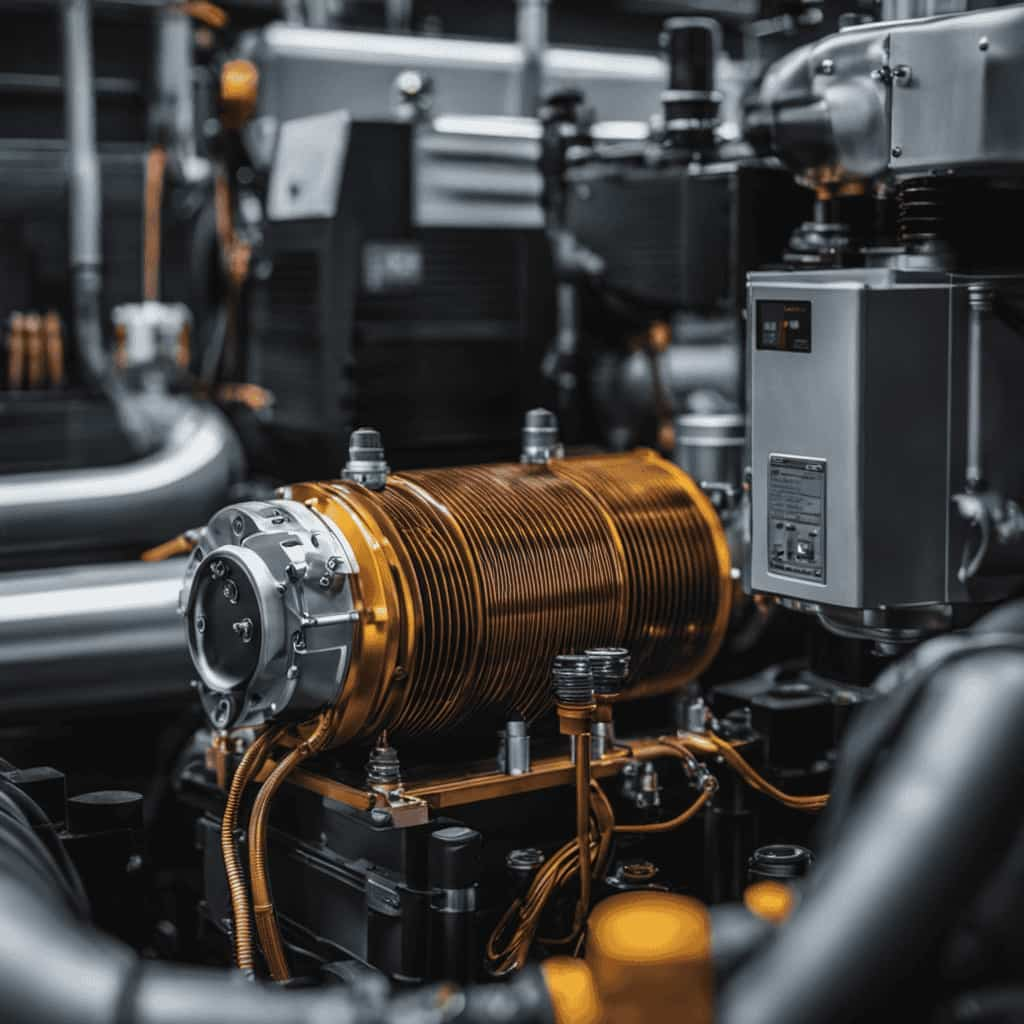
Now, let’s explore how implementing proper heat pump sizing and placement further enhances energy efficiency.
Implementing Proper Heat Pump Sizing and Placement
To ensure optimal energy efficiency, we must carefully determine the correct size and placement of our heat pump. Proper insulation is key to reducing heat loss and ensuring that the heat pump operates efficiently. A well-insulated home will require a smaller heat pump, saving both energy and money.
When it comes to placement, it’s important to consider factors such as noise levels and airflow. The heat pump should be installed in a location that allows for proper air circulation and easy access for maintenance. Additionally, placing the heat pump away from direct sunlight and sources of heat can help prevent overheating and improve its performance.
Regular Maintenance and Cleaning for Optimal Performance
We should regularly maintain and clean our heat pump to ensure optimal performance. By following a maintenance checklist and utilizing effective cleaning techniques, we can prolong the lifespan of our heat pump and maximize its energy efficiency.

Here is a simple maintenance checklist to keep in mind:
| Task | Frequency |
|---|---|
| Clean or replace air filters | Every 1-3 months |
| Check and clean outdoor unit | Twice a year, in spring and fall |
| Schedule professional maintenance | Annually |
In addition to regular maintenance, proper cleaning techniques are essential. Here are some tips:
- Clean the outdoor unit: Remove any debris or leaves around the unit and keep it clear of obstructions to promote proper airflow.
- Clean the indoor unit: Dust and vacuum the indoor unit regularly to prevent dirt buildup that can hinder performance.
- Clean the coils: Use a soft brush or cloth to gently clean the coils, removing any dirt or debris.
Regular maintenance and cleaning will ensure that your heat pump operates at its best. In the next section, we will explore the benefits of utilizing smart thermostat technology.
Utilizing Smart Thermostat Technology
By integrating smart thermostat technology into our heating system, we can optimize energy efficiency and effortlessly control our heat pump.

Smart thermostats provide advanced features that help improve energy consumption and optimize temperature control. These devices can learn our heating preferences and adjust the temperature accordingly, ensuring that our heat pump operates at its most efficient level.
With the ability to program temperature schedules and remotely control the thermostat through smartphone apps, we can easily regulate our heat pump’s operation even when we’re not at home.
Additionally, smart thermostats offer energy-saving modes and provide real-time energy usage data, allowing us to make informed decisions about our energy consumption.
With the use of smart thermostat technology, we can maximize our heat pump’s efficiency and reduce our energy costs effortlessly.

Supplementing Heat Pump Usage With Alternative Heating Methods
Using a few alternative heating methods in conjunction with our heat pump can significantly improve its energy efficiency. Here are some options to consider:
-
Geothermal Heating Benefits:
-
Harness the stable temperature of the earth to provide consistent and efficient heating.
-
Reduce electricity consumption by up to 70% compared to traditional heating systems.

-
Enjoy long-term cost savings and lower carbon emissions.
-
Solar Panel Integration:
-
Install solar panels to generate renewable energy for both heating and electricity needs.
-
Reduce reliance on the grid and lower utility bills.

-
Take advantage of government incentives and tax credits for solar installations.
Frequently Asked Questions
Can I Increase the Energy Efficiency of My Heat Pump by Using Renewable Energy Sources?
Yes, we can increase the energy efficiency of our heat pump by using renewable energy sources. Incorporating solar or geothermal power can reduce reliance on traditional energy and maximize efficiency.
What Are Some Common Mistakes to Avoid When Sizing and Placing a Heat Pump?
When it comes to sizing and placing a heat pump, it’s important to avoid common mistakes. By following best practices, you can ensure optimal efficiency and performance for your heat pump.
Is It Necessary to Hire a Professional for Regular Maintenance and Cleaning of My Heat Pump?
Regular heat pump maintenance by professionals ensures optimal performance and longevity. However, cost-effective DIY cleaning can also be beneficial. It’s important to keep filters clean, check for leaks, and ensure proper airflow for maximum energy efficiency.

How Can a Smart Thermostat Help Improve the Energy Efficiency of My Heat Pump?
A smart thermostat can improve the energy efficiency of our heat pump by utilizing features like programmable schedules and remote control. Integrating our heat pump with a smart thermostat maximizes comfort and reduces energy waste.
Are There Any Government Incentives or Rebates Available for Using Alternative Heating Methods Alongside a Heat Pump?
Yes, there are government incentives and rebates available for using alternative heating methods alongside a heat pump. These incentives encourage the use of renewable energy sources and can help lower your energy costs.
Conclusion
In conclusion, by understanding heat pump efficiency ratings, properly sizing and placing the unit, performing regular maintenance and cleaning, and utilizing smart thermostat technology, you can effortlessly boost your heat pump’s energy efficiency.
Additionally, considering alternative heating methods can further supplement the usage of your heat pump.

By implementing these strategies, you can save energy and maximize the performance of your heat pump, ultimately leading to a more cost-effective and eco-friendly heating solution.
Energy Efficiency
Understanding the Economics of High-Efficiency Heat Pumps

We have exclusive information about the economics of high-efficiency heat pumps. Prepare to analyze the cost-benefit ratio, assess the return on investment, and discover government incentives.
Our article will break down the factors affecting the economic viability of these innovative systems. Whether you’re a homeowner or a business owner, understanding the numbers behind high-efficiency heat pumps is crucial for making informed decisions.
So, let’s crunch some numbers and uncover the economic advantages of these energy-saving powerhouses.
Key Takeaways
- Conducting an economic analysis is crucial for informed decision-making.
- High-efficiency heat pumps offer significant long-term savings.
- Energy savings and reduced environmental impact contribute to a positive return on investment.
- Government incentives and financing options improve economic viability.
The Importance of Economic Analysis in High-Efficiency Heat Pump Installation
We believe that when considering high-efficiency heat pump installation, it’s crucial to conduct an economic analysis.

Economic considerations play a pivotal role in determining the long-term savings and overall cost-effectiveness of such installations.
By conducting a thorough economic analysis, one can assess the upfront costs, operational expenses, and potential savings associated with high-efficiency heat pumps.
This analysis allows for an informed decision-making process, ensuring that the chosen heat pump system aligns with the desired outcomes and budgetary constraints.
Evaluating the economic viability of high-efficiency heat pump installation involves considering factors such as energy efficiency ratings, maintenance costs, and potential utility rebates or incentives.

Additionally, the analysis should assess the projected lifespan of the heat pump system to determine the long-term savings and return on investment.
Understanding the Cost-Benefit Ratio of High-Efficiency Heat Pumps
Our analysis of the cost-benefit ratio shows that high-efficiency heat pumps offer significant long-term savings and a favorable return on investment.
When considering the cost effectiveness of high-efficiency heat pumps, it’s important to look beyond the initial upfront costs. While high-efficiency heat pumps may have a higher initial investment compared to traditional heating systems, the energy savings they provide over time more than make up for this difference.
These heat pumps are designed to operate with maximum efficiency, utilizing advanced technology to minimize energy consumption. This results in lower monthly utility bills, leading to substantial savings over the lifespan of the heat pump.

Additionally, the reduced energy usage helps to decrease the environmental impact, making high-efficiency heat pumps an innovative and sustainable choice for heating and cooling needs.
Factors Affecting the Economic Viability of High-Efficiency Heat Pump Systems
Factors such as energy prices, installation costs, and government incentives play a crucial role in determining the economic viability of high-efficiency heat pump systems.
Energy consumption is a key consideration when evaluating the economic feasibility of these systems. High-efficiency heat pumps are designed to minimize energy usage by efficiently transferring heat from one place to another. By reducing energy consumption, homeowners can significantly lower their utility bills, making the investment in a high-efficiency heat pump system more financially attractive.
Additionally, the environmental impact of high-efficiency heat pumps must be taken into account. These systems produce fewer greenhouse gas emissions compared to traditional heating systems, contributing to a greener and more sustainable future.

Evaluating the return on investment for high-efficiency heat pump installation requires careful consideration of these factors. With lower energy consumption and reduced environmental impact, high-efficiency heat pumps offer a promising solution for both cost savings and environmental stewardship.
Evaluating the Return on Investment for High-Efficiency Heat Pump Installation
When evaluating the return on investment for high-efficiency heat pump installation, it’s important to consider various factors such as energy savings, installation costs, and potential government incentives.
High-efficiency heat pumps offer significant energy savings compared to traditional heating systems. By efficiently transferring heat from the air or ground, these pumps can reduce energy consumption and lower utility bills. Additionally, high-efficiency heat pumps provide long-term benefits by reducing greenhouse gas emissions and promoting sustainability.
While the initial installation costs may be higher than conventional systems, the energy savings over time can offset this expense. Moreover, government incentives such as tax credits or rebates can further enhance the return on investment.

In the following section, we’ll explore government incentives and financing options for high-efficiency heat pumps, which can further improve the economic viability of these systems.
Exploring Government Incentives and Financing Options for High-Efficiency Heat Pumps
To further enhance the economic viability of high-efficiency heat pumps, we’ll now explore government incentives and financing options available. These incentives and financing options can significantly reduce the upfront costs of installing a high-efficiency heat pump system, making it more accessible and affordable for homeowners and businesses alike.
Here are five options to consider:
-
Government grants: Many governments offer grants or financial assistance programs to promote the adoption of energy-efficient technologies, including high-efficiency heat pumps. These grants can help offset the initial investment and encourage more people to switch to these energy-saving systems.

-
Tax credits: Some jurisdictions provide tax credits or deductions for the purchase and installation of high-efficiency heat pumps. These credits can help reduce the overall cost of the system and provide additional savings for the homeowner or business.
-
Low-interest loans: Financial institutions and government agencies often offer low-interest loans specifically for energy-efficient upgrades, including high-efficiency heat pumps. These loans provide favorable terms and repayment options, making it easier to finance the installation of these systems.
-
Energy efficiency programs: Many utility companies offer energy efficiency programs that provide incentives for customers to upgrade to high-efficiency heat pumps. These programs may include rebates, discounts, or other financial incentives to encourage the adoption of energy-saving technologies.
-
Power purchase agreements: In some cases, homeowners or businesses can enter into power purchase agreements with third-party providers. These agreements allow the customer to pay for the energy produced by the high-efficiency heat pump system, rather than the upfront cost of the equipment itself. This can provide a more affordable and flexible financing option.

Frequently Asked Questions
How Does the Efficiency of a High-Efficiency Heat Pump Compare to Traditional Heating Systems?
High-efficiency heat pumps outperform traditional heating systems in terms of efficiency and cost. By utilizing advanced technology, these pumps can achieve higher levels of efficiency, resulting in significant energy savings and lower utility bills.
Are There Any Maintenance or Repair Costs Associated With High-Efficiency Heat Pumps?
Maintenance and repair costs for high-efficiency heat pumps are important factors to consider. Regular maintenance can help prevent major issues, but occasional repair expenses may arise. These costs should be factored into the overall economics of the system.
Can High-Efficiency Heat Pumps Be Used in Both Residential and Commercial Buildings?
Yes, high-efficiency heat pumps can be used in both residential and commercial buildings. They offer energy-efficient heating and cooling solutions for various applications, making them a versatile choice for innovative and sustainable HVAC systems.
Are There Any Environmental Benefits to Using High-Efficiency Heat Pumps?
Using high-efficiency heat pumps has significant environmental benefits. They reduce greenhouse gas emissions and contribute to energy savings. These pumps are a sustainable and innovative solution for both residential and commercial buildings.

What Factors Should Be Considered When Choosing the Right Size High-Efficiency Heat Pump for a Specific Space?
When choosing the right size high-efficiency heat pump, several factors should be considered. These include the square footage of the space, insulation levels, climate conditions, and desired temperature settings.
Conclusion
In conclusion, understanding the economics of high-efficiency heat pumps is crucial for making informed decisions. By analyzing the cost-benefit ratio and evaluating factors such as installation costs, energy savings, and government incentives, we can determine the economic viability of these systems.
With their potential for significant return on investment and the availability of financing options, high-efficiency heat pumps offer a promising solution for efficient and cost-effective heating and cooling.
Embrace the power of these systems and unlock a world of economic benefits.

-

 Residential and Commercial Applications7 months ago
Residential and Commercial Applications7 months agoBest Amana Heat Pump Reviews
-

 Thermal Energy Transfer7 months ago
Thermal Energy Transfer7 months agoBreakthroughs in Modern Heat Pump Systems: Thermal Energy Edition
-

 Geothermal Heat Pumps6 months ago
Geothermal Heat Pumps6 months agoInnovative Geothermal Heat Pump Manufacturers Revolutionize Energy Efficiency
-

 Residential and Commercial Applications7 months ago
Residential and Commercial Applications7 months agoBest Heat Pump
-

 Geothermal Heat Pumps6 months ago
Geothermal Heat Pumps6 months agoUpgrade Your Comfort with Our Efficient HVAC Systems
-

 Air Conditioning5 months ago
Air Conditioning5 months agoExploring Energy-Efficient Air Conditioning Heat Pumps
-

 Energy Consumption4 months ago
Energy Consumption4 months ago10 Key Comparisons: Heat Pump Vs Traditional Heating
-

 Thermal Energy Transfer4 months ago
Thermal Energy Transfer4 months agoBoost Your Heat Pump Efficiency: Interactive Guide








